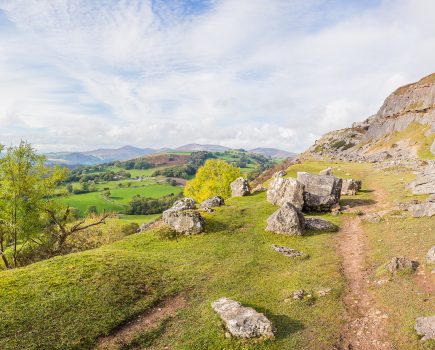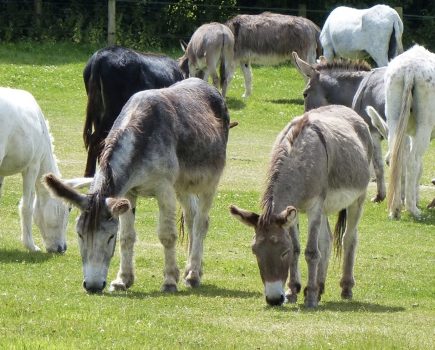James Strawbridge, co-presenter of TV show It’s Not Easy Being Green, tells us about his good life
James Strawbridge, co-presenter of TV show It’s Not Easy Being Green, tells us about his good life.In the summer of 2005 my family decided to move from a semi-detached house in Worcestershire to a smallholding in Cornwall. Over the following months I will be writing a diary about what it is like living a seasonal and sustainable lifestyle; including all sorts of information about the technology we use, the challenges, the success stories and the fun to be had along the way. This is a good point to introduce myself and explain how I got where I am today, looking out over the herb spiral and typing underneath a wind turbine. My name is James Strawbridge. I have always loved nature and being outside in rain or shine and, as far back as I can remember, I have been interested in the environment and British wildlife. It is fair to say that my family have always been slightly unconventional. My dad, Dick Strawbridge, was a lieutenant colonel in the army, with a passion for Heath Robinson-style engineering, and my mum, Brigit, has always had a keen interest in alternative remedies, eco body products and low impact living. My sister loves singing and Spanish weather and hates mud and farm smells. With dad in the army our family moved at least every year or so. This always presented real problems with how we go about living and confronted us with serious barriers to our dreams of self-sufficiency. The solution was a bit unorthodox. We were always the friendly, slightly odd neighbours who moved in with a motley collection of chickens and goats. The vegetable patch was always one of the first jobs to sort out in each new garden and we had a massive selection of container plants from herbs and tomatoes to our fig trees. However, when dad left the army, we eventually put down roots in the Malvern hills. It was great, a house of our own and the chance to settle down. Needless to say, the grass is always greener and soon it became clear that we wanted more space, room for a workshop and enough land to strive towards self-sufficiency. This culminated in a drastic change of lifestyle and the making of It’s Not Easy Being Green (2006), a successful BBC TV series that followed our family move from a comfortable, warm, decorated semi-detached house to a roofless, derelict farm in Cornwall. Sometimes it is hard not to ask “Why?” but, on the whole, every day has been a pleasure and the progress we have made, and the amount I have learnt, has been invaluable. We attempted to renovate the house sustainably. ‘Sustainability’ is a word which now is everywhere in the media, politics and business. I was lucky enough to study terms like ‘sustainability’ at university whilst on an environmental history degree around the same time as the move and I had done some environmental volunteer work in Nepal based around appropriate rural technologies, so fortunately I had some grasp of the theory involved in eco-projects. The practice of building a sustainable smallholding was another matter! We built an aqueduct and water wheel to generate electricity, installed a solar thermal hot water system, erected a grid linked wind turbine, dug in a heat sync for our greenhouse, mounted a dual solar and wind system for using our spring water in the house, planted lots of trees, fruit and vegetables, insulated the newly built roof, fitted wood burners, reared pigs and poultry, and used a compost loo. We still use the compost loo and all of the other technologies are functioning well. As smallholders well know, living in the countryside is ideal. You feel a real connection to the seasons and being outside is great for both body and mind. As a result of making the move towards self-sufficiency we received thousands of emails, from pleas for advice to me getting propositioned by ‘experienced’ women. It was all very positive feedback but there was one criticism: “It’s alright for you. But, what if you live in a city?” The answer was quite simple; being green can be easy wherever you are. So, we made another TV series. This time I co-presented it with Dad, It’s Not Easy Being Green, and we set off round the country with our bio-diesel fuelled Land Rover to show other people in various towns and differing circumstances the financial and environmental benefits of going green. We built a homemade solar thermal system in London, redecorated with eco-paints in Staffordshire and did numerous other sustainable projects around Britain. Since then I have been living in Cornwall helping to run the holding. I have made appearances on TV shows as an eco expert and recently got offered a job in Fiji. The location made the decision difficult, because I had chosen to reduce how much I fly, but the job was for four months on a desert island promoting the local community and eco-tourism. It was absolutely amazing! My job title was ‘sustainability manager’ and my work there featured on the BBC television show Paradise or Bust (2008). Since my return to Cornwall I have been co-writing a book on seasonal living with my dad and working hard in the garden. I am also currently working as sustainability workshop coordinator for the nationwide charity ‘Wastebusters’, teaching in schools and promoting environmental awareness.Over the coming months I will be writing about what I have learnt from traditions and folklore, about monthly festivals, to what I am doing here at New House Farm, tips on what to grow in the garden, what to forage and when, and maybe – if I am allowed – some ideas for recipes. I hope that some of what I will have to say will be new, interesting and informative, especially on the alternative technology front, but I also realise that much of what I have to say will be old news to many established smallholders. So, if you’re already in the know, please carry on with what you are doing and, if you aren’t then get involved!
READ MORE ARTICLES FROM JAMES STRAWBRIDGE
SUBSCRIBE – to Country Smallholding magazineBOOKSHOP – Browse the latest books for smallholdersFORUMS – discuss smallholding issues







